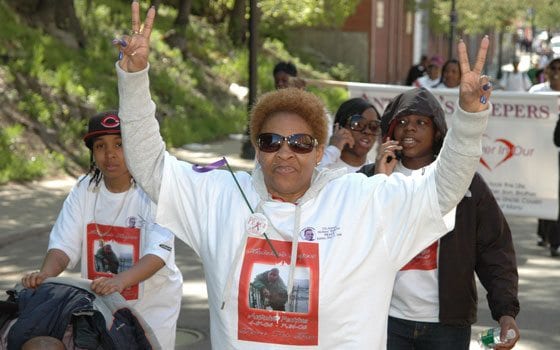

Author: Talia WhyteCommunity activists, family members and concerned citizens gathered in Fields Corner this past May for the 12th Annual Mothers’ Walk for Peace, organized by the Louis D. Brown Peace Institute. With the Dorchester staple possibly nearing the end of the line, many in the community have rushed to offer their support.
Reeling like many other nonprofits from the nation’s economic recession and significant cuts in state funding, the Louis D. Brown Peace Institute may be forced to shut its doors at the end of the month.
But the power of community could make a difference in staving off the local staple’s demise.
Last week, Dorchester residents Tom Gannon of the Fields Corner Civic Association and real estate agent Alan Issokson organized a fundraiser on behalf of the institute, bringing in $7,000 to help the anti-violence organization stay afloat. While the fundraiser fell short of its $10,000 goal, Gannon said he was proud that so many members of the community — the event drew 150 people — came together so quickly to lend a helping hand.
“The community recognizes the good work Tina Chéry and her staff do for everyone here,” Gannon said. “The institute has the credibility to work on these issues of violence because they have gone through the same horrors themselves.”
Chéry founded the Peace Institute in 1994 following the loss of her 15-year-old son, Louis D. Brown, to gang violence. The organization’s main objective is the same today as it was then — to help families that have been victimized by violence to manage the emotional toll by connecting them with people who have had to make the same difficult journey.
“People don’t realize that in a homicide, when a victim is dead, it is the families that are left behind dealing with a life sentence,” Chéry said in a September 2007 interview with the Banner.
Through the institute’s Survivor Outreach Services program, Chéry’s staff reaches out to families within 48 hours after a murder. They provide grieving and often unprepared families with information on topics like making funeral arrangements and locating social services.
The institute also publishes a “Peace Curriculum,” a school program designed to teach students the benefits of peace and community service. The curriculum is the first of its kind in the nation.
Milton Jones, the institute’s director of operations, said that all of the work and programs developed over the last 14 years could end Dec. 31. He said that the institute has so far raised $80,000 of the $200,000 it needs to stay open.
Though the organization still faces an uphill climb, Jones said he was happy to see the community come out in force to support the institute with their donations, despite the bad economy.
“We are very grateful about the outpouring of support from people all over the city,” he said. “Our focus right now is to be aggressive about our donor base. We are relying on the community to keep us open.”
A major blow to the institute’s financial health came in October, when Gov. Deval Patrick announced more than $1 billion in emergency budget cuts and spending controls in response to the national economic downturn and lower-than-expected state revenues. The decision cost the institute $75,000, nearly half its total operating budget, according to a November report in the Boston Globe.
Despite the costly impact of the cuts on the institute, Jones said that he doesn’t fault the governor.
“We understand why the governor had to do what he did, and we [place] no blame on the government for the decisions they have made regarding the budget,” Jones said. “The governor’s interests should be [focused] on the entire community, not just us.”
Dorchester resident Marsha Ward said she became upset when she heard about the institute’s potential fate. She said one of her neighbors recently experienced the horror of dealing with a family member’s murder, and she was thankful that the Peace Institute was there to get the family through their pain.
“Tina is wonderful,” Ward said. “I always wonder about what it would be like in our community if Tina’s group didn’t exist. There are so many people here who wouldn’t know what to do with themselves to get through a killing of their child or loved one.”
Gannon, of the Fields Corner Civic Association, said he will continue to fight for the Peace Institute and do whatever is necessary to keep it open.
“It is interesting to see how many people are touched by the institute,” he said. “We need to keep these angels alive because they are doing God’s work.”
For information about making a donation to the Louis D. Brown Institute, visit www.louisdbrownpeaceinstitute.org.






